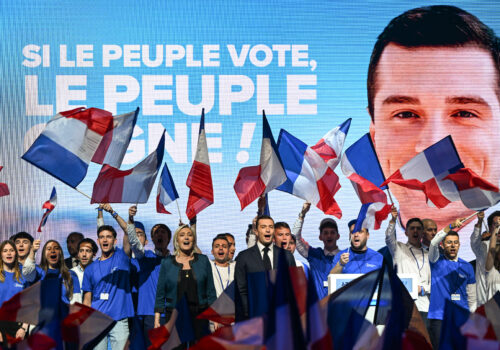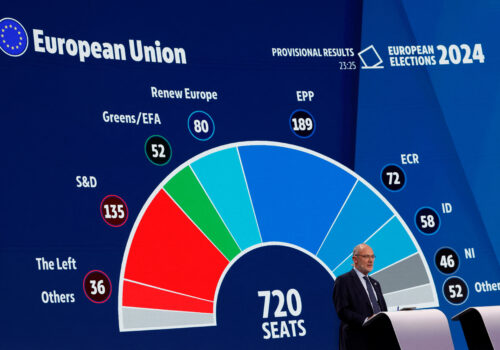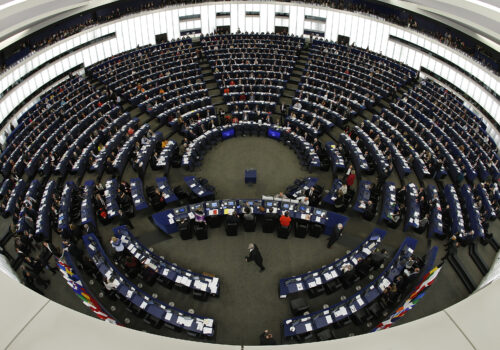Macron rolls the dice on France’s future
You have to think back to British Prime Minister David Cameron’s Brexit referendum in 2016 to recall a European leader taking a risk with stakes as high as French President Emmanuel Macron’s decision to call a snap parliamentary election in response to his party’s drubbing in Sunday’s European elections.
To refresh memories: Cameron promised voters in January 2013 that if they brought Conservatives back to power, then he would give them a referendum on the United Kingdom’s European Union membership. He lost the referendum for a host of reasons, not least of them because he failed to convince his own party faithful and underestimated the Leave campaign’s ability to mobilize supporters.
Cameron was willing to take a high-stakes, long-term political gamble, one that would shape the very nature of his country and the European Union, to achieve what he had concluded was a short-term political necessity. Macron is doing the same today.
The French president appears to be betting on one of two outcomes:
- For Macron, the best outcome would be if snap election voters reverse their votes of last Sunday, which gave Marine Le Pen’s far-right National Rally 31.37 percent of the vote, more than twice the share that voted for Macron’s party (14.6 percent). This is also the least likely outcome. Macron’s own supporters consider a victory in either the first round, on June 30, or the second round, on July 7, doubtful. Macron is unpopular, France’s unemployment rate is high, immigration concerns have mobilized many citizens to support opposition parties, and there is growing estrangement between voters and France’s political leadership.
- The more likely outcome is that throughout the rest of his presidential term, which runs until 2027, Macron will have to govern with a National Rally prime minister in what the French call “co-habitation.” Though National Rally is unlikely to win an absolute majority of the 577-seat National Assembly, it quite likely could emerge as the strongest party. Le Pen, who has her eye on succeeding Macron as president in 2027, would put forward as prime minister her protégé, the twenty-eight-year-old Jordan Bardella. Bardella, the popular son of an Italian immigrant, led the European Parliament campaign and has rallied the anti-immigrant vote with the slogan, “France is disappearing.”
Writes Roger Cohen in a must-read analysis in the New York Times, “France would then be confronted with the consecration through high political office of the extreme right, an idea held unthinkable ever since the Vichy government ruled France in collaboration with the Nazis between 1940 and 1944.”
Why is Macron willing to throw the dice on France’s future in this manner, shocking the country, its stock market, the French media, and his own party just six weeks before Paris hosts the Olympic Games? Cohen quoted Paris Mayor Anne Hidalgo as being “stunned” by the “unsettling” decision.
Macron is gambling that National Rally will perform so badly in office over the next three years that voters will reject any notion of Marine Le Pen as president in 2027. French voters could then put to rest the notion that the far right can run France. (Macron himself is term limited and will be unable to run.)
Macron could have responded in many ways to Sunday’s humiliation in European elections. His options ranged from toughening immigration policies to shaking up his government.
He’s taken perhaps the riskiest course available. “The rise of nationalists, of demagogues, is a danger for our nation,” Macron said on Sunday. “And also for Europe, for France’s position in Europe and in the world.” He portrayed himself as a leader rising to the demands of his times, rather than being history’s victim.
Time will determine whether Macron’s response this week is visionary or reckless. If the Cameron experience has any lesson, it is that the gambler has limited control of the outcome.
Frederick Kempe is president and chief executive officer of the Atlantic Council. You can follow him on Twitter: @FredKempe.
This edition is part of Frederick Kempe’s Inflection Points Today newsletter, a column of quick-hit insights on a world in transition. To receive this newsletter throughout the week, sign up here.
Further reading
Mon, Jun 10, 2024
Experts react: How the European Parliament’s right turn is playing out across the continent
Experts react By
The centrist coalition remains in power, but the far right made striking gains across the continent. What will this mean for the EU's future?
Sun, Jun 9, 2024
As the far right rises in Europe, can the center hold?
Fast Thinking By
Elections for the 720-seat European Parliament concluded on Sunday. Three Atlantic Council experts share their insights on the initial results.
Mon, Apr 15, 2024
Your primer on the European Parliament elections and how they will shape the EU
Eye on Europe's elections By
As Europe heads to the polls to elect the 10th European Parliament this June, the Europe Center is breaking down the key people and issues to know.
Image: Reaction to the news that Emmanuel Macron, president of France calls ne legislative elections on the election evening of the Rassemblement National party on the day of the European elections, in Paris, France on 9th June, 2024. Reaction a l annonce qu Emmanuel Macron convoque des elections legislatives lors de la soiree electorale du parti Rassemblement National sur le jour des elections europeennes, a Paris, France, le 9 juin 2024.


